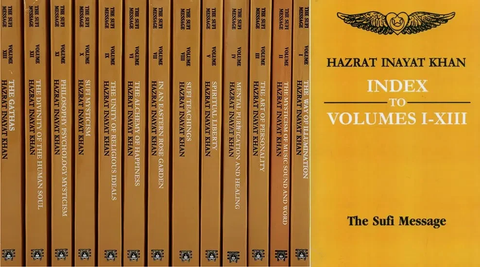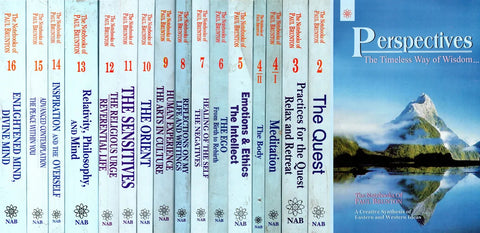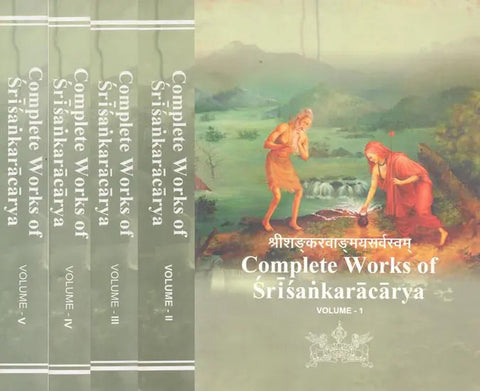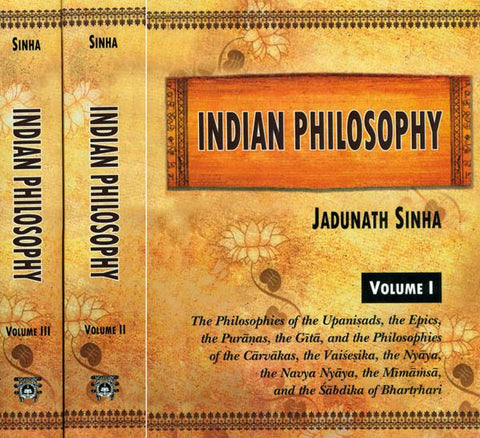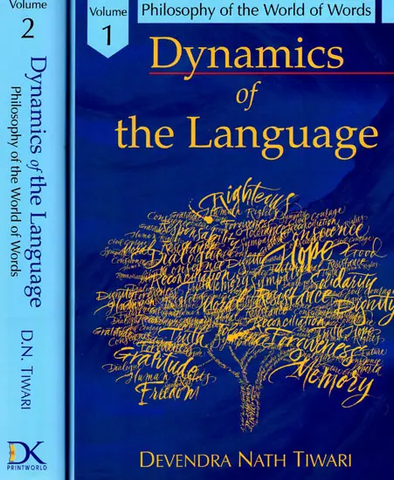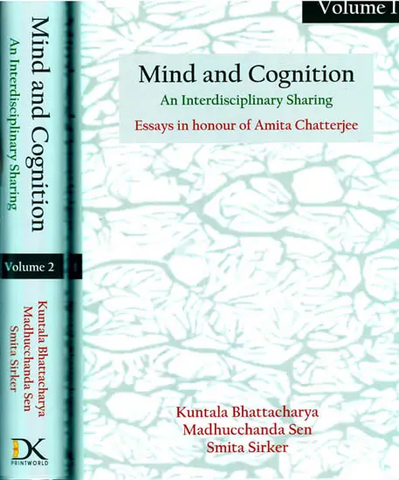Your cart is empty now.
The anthology Alternative Standpoints: A Tribute to Kalidas Bhattacharyya is a tribute to Prof. Kalidas Bhattacharyya, the eminent thinker of twentieth-century India, on his birth centenary by his students. A distinguished philosopher and an academician, Prof. Bhattacharyya presented philosophy in an original way with scientific spirit. He was essentially a metaphysician and his metaphysics was deeply rooted in the traditions of Advaita Vedanta and Saivism. His ultimate concern was to present a theory of freedom and a theory of the possibility of realizing that freedom.
In this collection eminent scholars have written on different aspects of his philosophy. This anthology is divided into four parts—the first one concentrating on his metaphysics, the second part dealing with his views on freedom, the third one with education and science and the fourth one is a reminiscence of his student and his family members. In short this anthology tries to present a picture of Kalidas Bhattacharyya as a philosopher and also as a man within the two covers.
This volume is expected to familiarize students and present-day philosophers the persona of Prof. Bhattacharyya and his philosophical positioning and pedagogical skillset.
Dr Madhumita Chattopadhyay is a professor in the Department of Philosophy, Jadavpur University, Jadavpur, Kolkata. Though her area of research is Buddhism, she is very much interested in the philosophy of Contemporary Indian thinkers specially of the nineteenth and twentieth centuries. She has been awarded with different national and international scholarships like the Fulbright Visiting Lectureship and Charles Wallace India Trust Fellowship. She has edited three books and written three. One of her important books is Walking Along the Paths of Buddhist Epistemology.
It was a nice spring afternoon in March 2011. The meeting of the Advisory Committee of CAS (Phase IV) in Philosophy was going on in the room of the Head, Department of Philosophy, Jadavpur University. Then our respected external expert, Professor Gautam Biswas of Assam University, Silchar requested the then HOD of Philosophy to organize a national seminar on the philosophy of Professor Kalidas Bhattacharyya, since it was the birth centenary year of this renowned thinker of modern Indian. As a Centre for Advanced Study in Philosophy, it falls as a responsibility of the Department to take initative to make the present generation of students aware of the philosophy of this distinguished scholar. To keep his request, the Department of Philosophy, Jadavpur University organized a national seminar on the philosophy of Kalidas Bhattacharyya, in March 2012 in which scholars, most of whom incidentally appeared to be direct students of Professor Bhattacharyya, participated and discussed different aspects of their beloved teacher.
After the success of the seminar, the Department decided to publish an anthology on the philosophy of Professor Kalidas Bhattacharyya. It was also decided that in this anthology some papers which were presented in the seminar may be included, but importance would be given to new research articles. Accordingly we asked eminent scholars to contribute to this volume. In response we received papers from eminent scholars on Kalidas Bhattacharyya like Professor Kalyan Bagchi, Professor Amitabha Dasgupta, Professor Gautam Biswas, Professor Tara Chatterjee and others. In this connection we want to specially mention the contribution of Professor Gautam Biswas. In spite of his terminal illness, fighting with lung cancer, in a Mumbai hospital, he always used to inquire about the progress of the work and intimated us about the probable writers whom we could contact for this volume. He himself promised to write a paper on the aesthetics of Kalidas Bhattacharyya, and sent it to us with an humble request to go through it critically and consider whether it can be accommodated in the anthology. A few days later we got the news of the passing away of Professor Gautam Biswas and it was very shocking for us; and for me personally it was a great loss as he was one of my academic guides. Since organizing a seminar on the philosophy of Kalidas Bhattacharyya and publishing an anthology on the same idea were his brain child, we decided to dedicate this anthology in the memory of Professor Gautam Biswas.
I will be failing in my duty if I do not mention the name of another expert of CAS Advisory Committee, who seconded the proposal of Professor Gautam Biswas to publish an anthology on Prof. Kalidas Bhattacharyya. He is none other than Professor S. Kulkarni. The Department is thankful to him for his suggestion and help in bringing out this volume. The Department is grateful to all the contributors who in spite of their busy schedules and academic commitments could find out some time to write on some aspect of this great mind, Kalidas Bhattachayya.
It is in course of organizing this seminar that we got an opportunity to interact with the family members of Kalidas Bhattacharyya. Professor Kalidas Bhattacharyya is survived by three sons and one daughter. Of the four, only his daughter pursued her studies in philosophy and worked on the philosophy of her grand-father Krishnachandra Bhattacharyya in the perspective of modern phenomenological movement. We are grateful to all his family members for providing us with photos and information about the personal life of this eminent philosopher. At the time of compiling this anthology we requested them to write something on their father. In compliance with that request Professor Goutam Bhattacharyya, who by profession is a physicist, contributed a thought-provoking paper on the interrelation between physics and philosophy, which will definitely throw a new light to the researches on philosophy of science and, on behalf of his brothers and sisters, wrote a memoir on his father. This memoir helps us to understand Kalidas Bhattacharyya not as a philosopher but as a loving affectionate father, thus adding a new dimension to our understanding of him. We are fortunate enough to have another memoir of one student of Kalidas Bhattacharyya, Dr Angshuman Bhattacharji who after completing his duty as a Professor of Philosophy in a college in Assam, has joined the publication unit of Ramakrishna Mission Institute of Culture, Golpark, Calcutta. Dr Bhattacharji has written on the teacher Kalidas Bhattacharyya seen through the lenses of a student. We are thankful to all the family members and to this student of Kalidas Bhattacharyya for giving us the opportunity to provide a comprehensive picture of this great thinker. In this context we want to note the contribution of Dr Sirajul Islam, Professor, Department of Philosophy and Comparative Religion, Viswa Bharati in collecting the photos of Kalidas Bhattacharyya from the family album and making them accessible to us.
The Department is thankful to the University Grants Commission, New Delhi for the financial assistance to get this book published. We are grateful to Mr Susheel Mittal and the editorial team of Suryodaya Books for taking all measures to get this book an international standard, in look and feel. The best judges of a book are its readers. The editor will feel her task to be accomplished if this anthology is of any help to the scholars who want to pursue researches on the philosophy of Professor Kalidas Bhattacharyya.
One of the greatest thinkers of Bengal who presented philosophy in an original way with scientific spirit is Professor Kalidas Bhattacharyya. He was born in a very traditional family which has produced three great philosophers of modern India. His father was late Professor Krishna Chandra Bhattacharyya who was often honoured as “Indian Kant” and his elder brother was late Professor Gopinath Bhattacharyya who also contributed much to the spread of philosophy of India.
In his philosophical enterprises, Kalidas Bhattacharyya is well known for his emphasis on the alternative standpoints. His philosophical career started sometime around 1938 when he was only 27 years old and his first book Alternative Standpoint in Philosophy was published at the age of 32. In fact, he developed his father’s idea of theoretically undecidable alternatives in philosophy. Though he himself opined that “nothing of excellence could be expected of it”, this book invited lots of dialogue among many great scholars of his time and also of the subsequent years. However, he never gave up this notion of alternations though, his notion changed as days rolled on. In the early period of his career by this notion he wanted to insist on the following poinrs:
1. that there is no one definite final Truth (Absolute);
2. that there are several claimants to this ultimacy;
3. that all their struggle with one another for this ultimacy is only in the region of theoretical possibility;
4. that “theoretical possibility” is only another name of actual altermation, i.e. alternation in the region of actuality;
5. in respect of clearly statable and acceptable solid foundation, related to logic or experience, all of these alternatives stand refuted except one; and
6. which, however, never obtains when it is a question of Ultimate Truth.
Though in the early stage of his philosophy, he denied the existence of one definite final Truth, in the later stage of his philosophy, he was rather inclined to admit the one Truth or the Absolute; but even at this stage he did not give up his notion of alternations. So he said that though there is one Truth, that Truth can be formulated in different alternative ways. In other words, there are different alternative formulations of the Absolute and each of these formulations could be as good as other from the standpoint of logic or experience.
There is not much significant difference, however, between his earlier position and later position, between regarding the Absolute itself as alternating and alternative formulations of the Absolute. The difference may be said to consist between saying “A or B or C, etc. as the ultimate Absolute” and “the Ultimate Absolute as A or B or C, etc”. In the latter case the Absolute is considered as a substance and A, B, C, etc. are its different adjectives, while in the former case there is no statement at all of any substantive Absolute; it is only emphasized that to be ultimate, being itself has a functional, adjectival character of A,B,C, etc. Bhattacharyya holds that the expressions “in itself”, “as A”, “as B”, “as C”, etc. state actually different forms regarding how the Absolute is to be grasped. They suggest different alternative ways of grasping the Absolute. He thinks that merit of this alternative approach is that it enables one to develop a full sympathetic understanding of the positive possibility of each of these philosophies through cultivating, as far as possible, an authentic catholic attitude to each possibility without permanently committing oneself to any of them. Thus one can develop a scrupulously neutral attitude towards all of them. This way of looking at different philosophical positions is termed by him as “super-philosophy” which he describes as “a strict attitude of neutrality, a transcendence equidistant from every one of these”. Obviously this outlook makes his view similar to that of the Madhyamika philosopher Nagarjuna. In his text Malamadhyamaka-Sastri Nagarjuna also in his attempt to find the essence of reality starts with taking note of all the possible alternative positions; he thus insisted on transcending all philosophies, drsti without committing oneself to any particular philosophical position. But, there is a fundamental difference between the approaches of Bhattacharyya and Nagarjuna. In order to transcend the alternative philosophical positions, Nagarjuna, with his method of prasanga, establishes all of them to be erroneous, but Bhattacharyya’s position is to transcend them all, even recognizing all of them as equally correct. In spite of the fact that all the alternative theories are equally correct, all of them have to be transcended; otherwise each of them cannot be viewed in its full possibility from a super-philosophic distance. Thus the concept of alternation has been used by him also as a method to reach the goal of philosophy. Philosophy, according to him, is “a systematic study of such basic notions as space, time, substance, causality, matter, life, etc. with the help of which.... classical science explains” all that is real. The task of philosophy is the apprehension of the basic a priori reals in themselves and in their interrelationship with one another as also their relations with things of the world. For conducting a trans-natural study of the sui generis behaviours of these basic reals, the need for a now transcendental method was felt by Bhattacharyya. He found it in the form of reflective immediate awareness of the self-contained-ness of these reals. One of the chief concerns of Bhattacharyya was to point out the nature and function of philosophical reflection and its relation to unreflective experience. He point out that what such reflection brings to light was there in the pre-reflective stage of experience, but was there as undistinguished and fused. This state of fusion is not a mere subjective failure to distinguish, not a mere confusion but rather an objective implicitness. Reflection is an act of distinguishing entities as distinct. Space, time or self which are objects of philosophy are all given in pre-reflective experience but only as undistinguished from and fused with the empirical world. It is the task of philosophy to let them emerge in their distinctness.
The concepts with which philosophy deals are supposed to be the presuppositions of sciences, but they are neither axioms nor postulates, they are facts, but facts “of the second order”. As a study of these concepts he describes philosophy as “meta-science”, except that unlike the study of postulates it is a study of facts, though the facts here are of quite another order. In this sense philosophy is distinct from all other sciences and it is easy to see that what is called philosophy is nothing but metaphysics. In his Presuppositions of Science and Philosophy and Other Essays he points out that “metaphysics.....studies....facts... of a trans-natural world”. As a study of the facts which are the presuppositions of other sciences, philosophy is a second-order study.
But philosophy itself has a presupposition. The presupposition is that the trans-natural facts may not be amenable to observational verification; they are knowable through some other method-they may be found to be related to observable facts and that there may be specific ways to know them as distinguished from these observational facts. These presuppositions are studied by epistemology. Therefore, epistemology is meta-metaphysics or meta-philosophy. While clarifying the notion of epistemology, Bhattacharyya states, “I have been using the term ‘epistemology’ in the Kantian sense of ‘theory of knowledge’ where knowledge is not taken as an empirical phenomenon or a set of empirical psychological phenomena”. (My reactions) About the epithet “meta” his observation is: Meta-X is thus the study of the movements of thought by thought itself-a type of self- relvealing consciousness, not indeed positing itself as an object for itself, for that is a theoretical impossibility, but just moving self-consciously”.
In this sense epistemology as meta-philosophy studies the presuppositions of philosophy as meta-physics and also self-consciousness in a self-conscious way. While stating his reactions to the observations made by distinguished scholars on his philosophy, Bhattacharyya makes a hierarchy among different branches of study; in the first level we have the empirical sciences, in the second level logic, mathematics and metaphysics and in the third level epistemology. Correspondingly in the level of consciousness a distinction is observed in terms of consciousness of an object, consciousness of consciousness which may be regarded as psychological introspection and self-evident consciousness, i.e. consciousness, he looks as the svaprakasa consciousness or as consciousness folding upon itself where the acts of illumination and the illuminated are one and the same thing.
| Preface | vii | |
| Photos of Professor Kalidas Bhattacharyya | x | |
| Short Biodata of Professor Kalidas Bhattacharyya | xiii | |
| List of Publications of Professor Kalidas Bhattacharyya | xvi | |
| Introduction | 1 | |
| I. Metaphysics | ||
| 1 | Reflection, Alternaion and Meta-Philosophy: An Overview of the Philosophy of Kalidas Bhattacharyya | 16 |
| 2 | Knowing Beforehand | 37 |
| 3 | From Language to Metaphysics | 53 |
| 4 | Metaphysics: A Reflective Engagement with Experience | 67 |
| 5 | Kalidas Bhattacharyya on Object and Content | 80 |
| 6 | Kalidas Bhattacharyya on Vedantic Anekantavada: An Evaluation | 94 |
| 7 | Anekanta Vedanta | 112 |
| 8 | Man as a Natural and Transcendent Being | 125 |
| 9 | The Concept of Self in Buddhism | 140 |
| II. Freedom | ||
| 10 | The Art of Becoming: Kalidas Bhattacharyya's Concept of Freedom | 154 |
| 11 | Art as Freedom: Aesthetics of Kalidas Bhattacharyya | 159 |
| III. Education and Science | ||
| 12 | Kalidas Bhattacharyya: The Educationist | 178 |
| 13 | Evolution of Post-Newtonian Thoughts in Physical Science: From Definite to Indefinite | 197 |
| IV. Memoirs | ||
| 14 | Revisiting Kalidas Bhattacharyya: A Life Merged into Philosophizing | 226 |
| 15 | Remembering Our Father | 235 |
| Contributors | 240 | |
| Index | 242 |

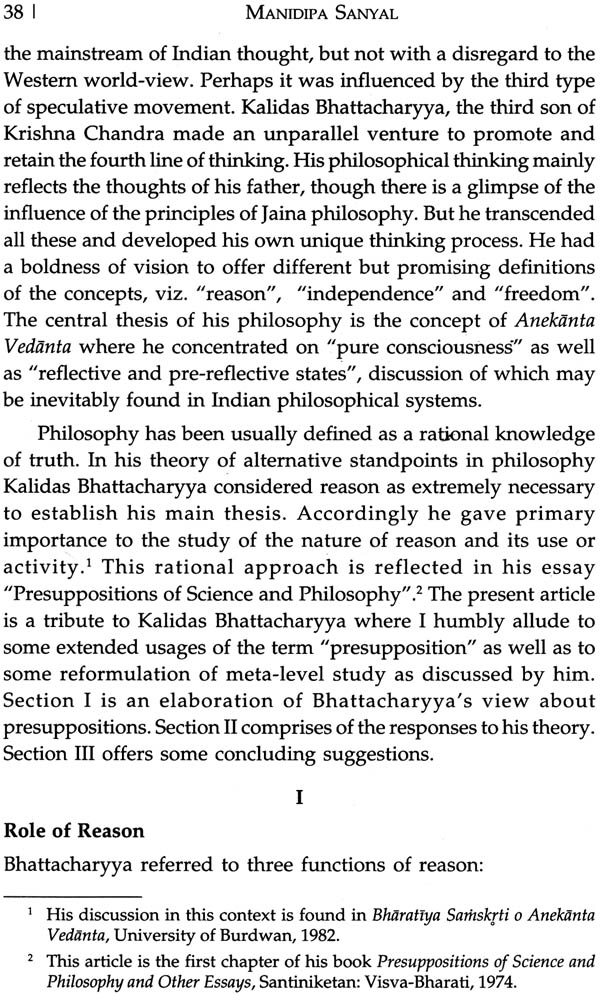

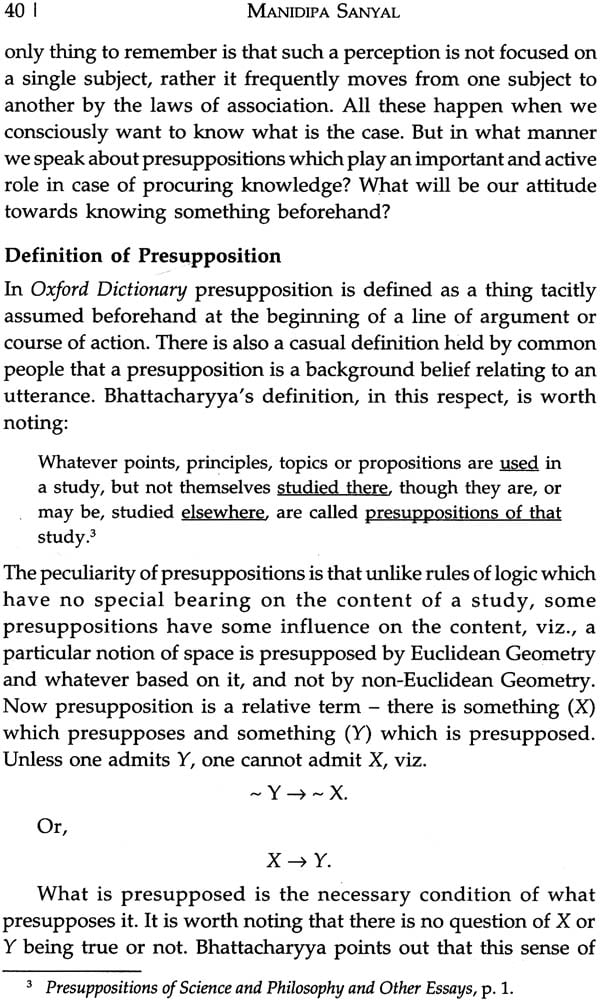
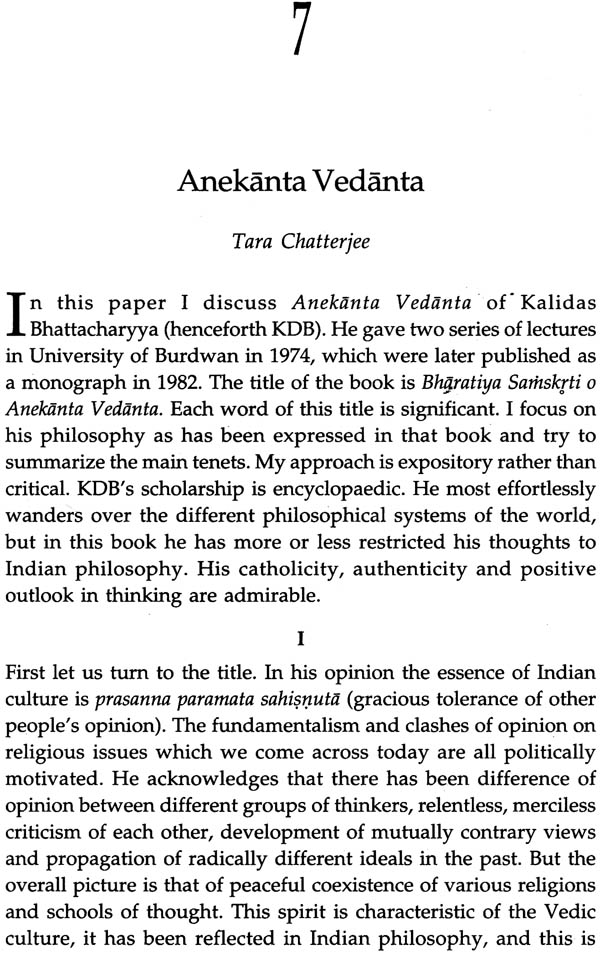
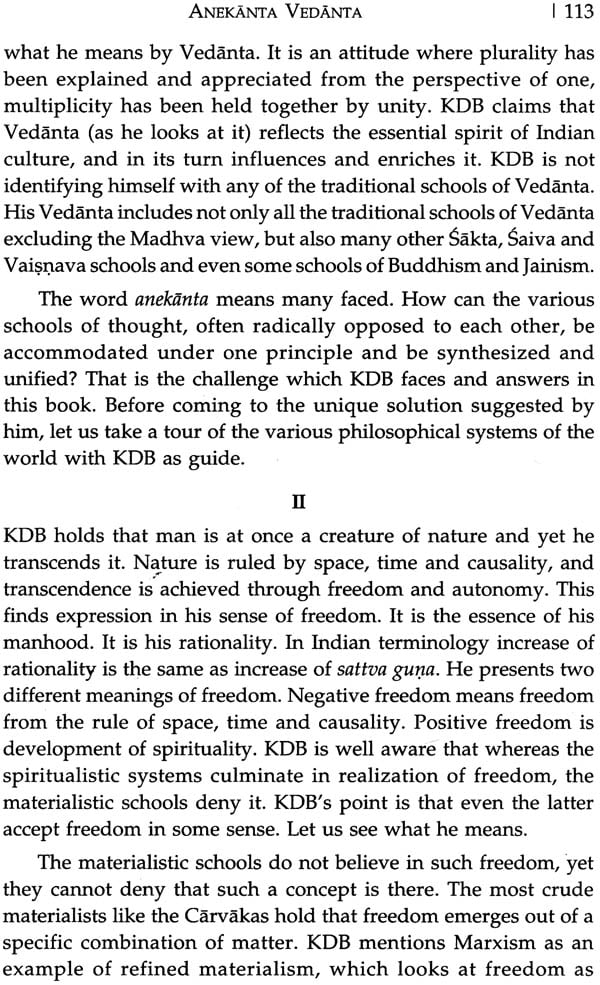
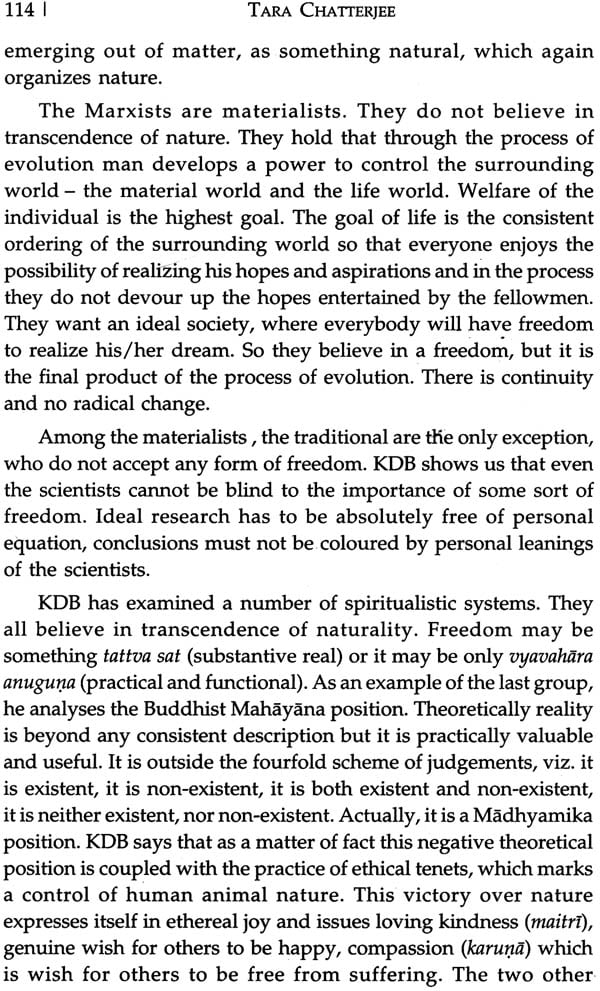
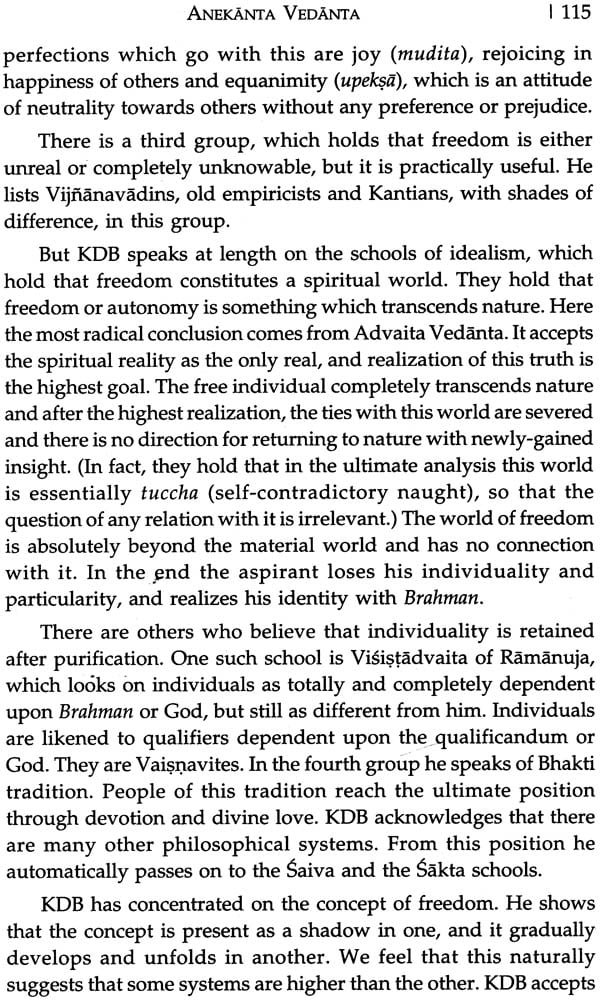
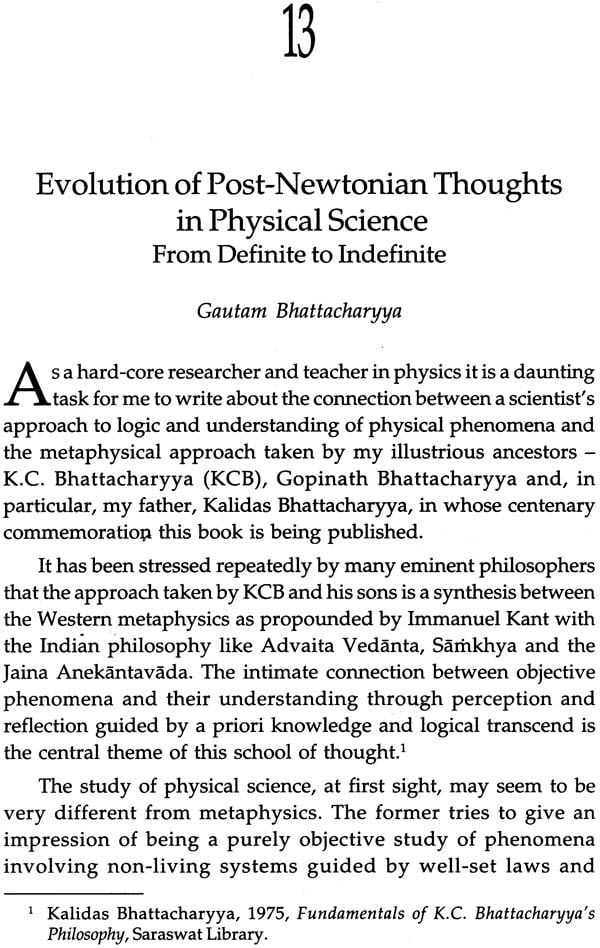
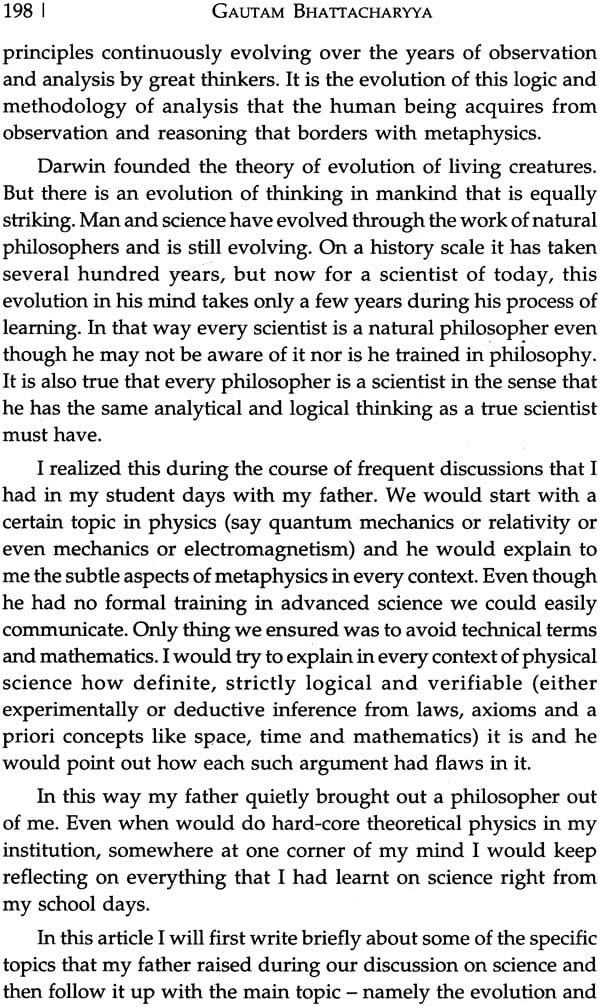
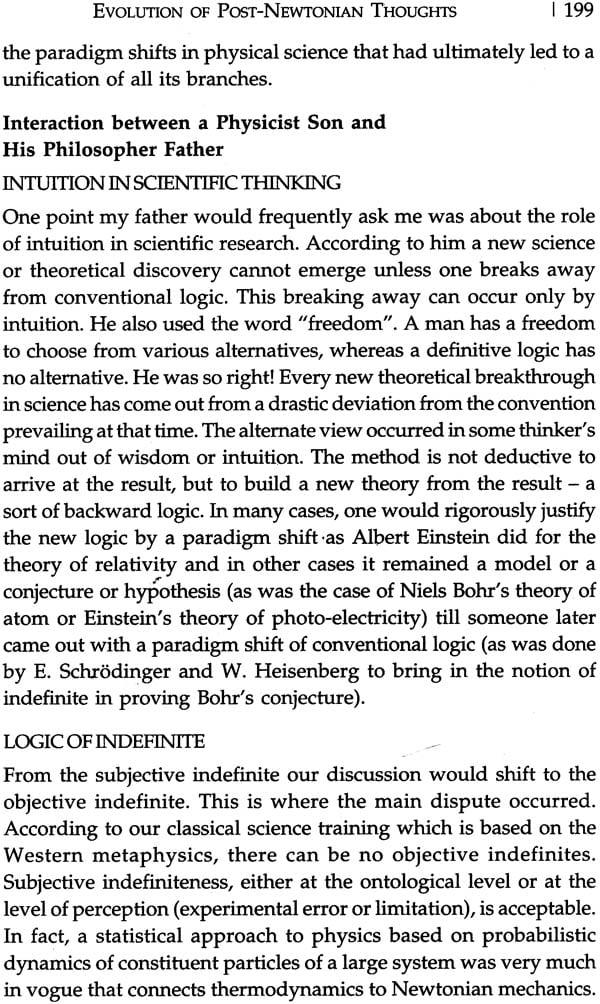
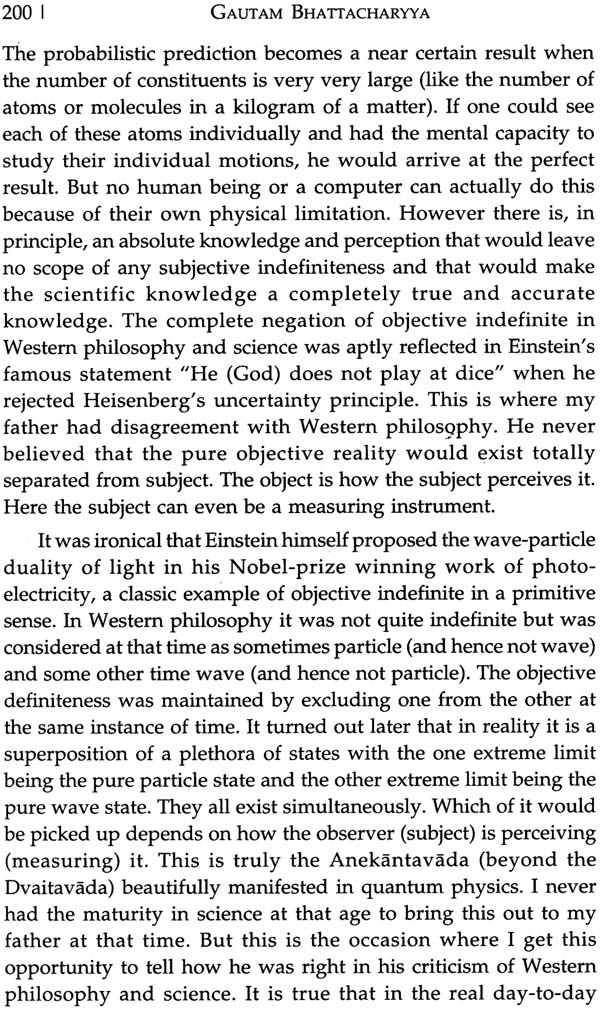
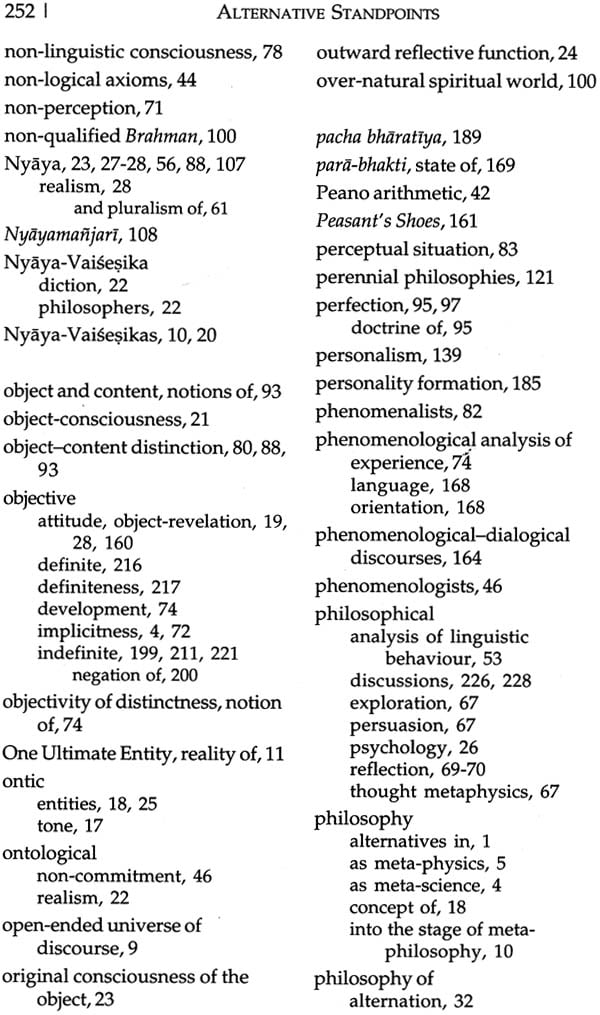
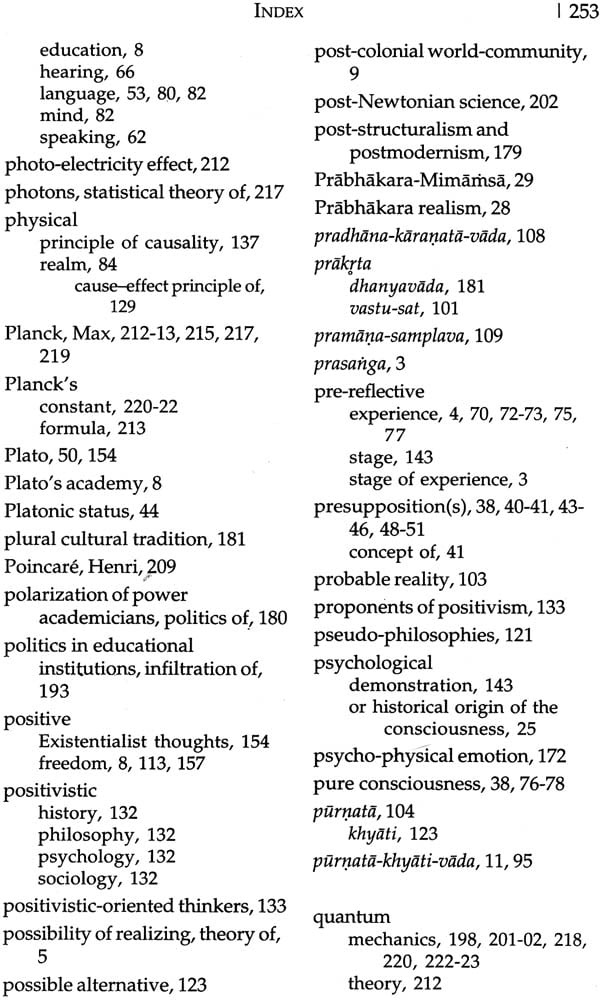
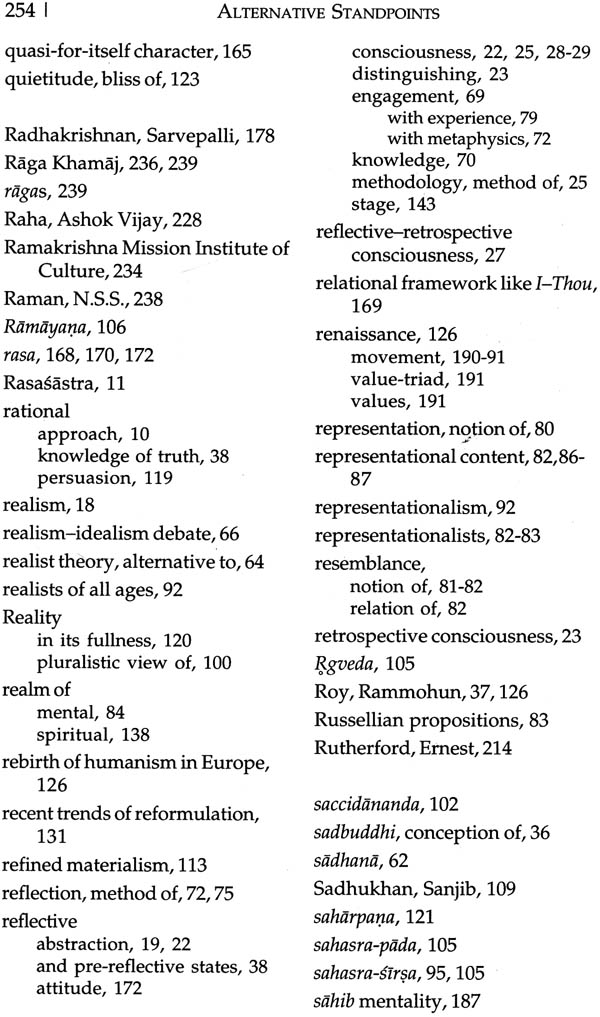
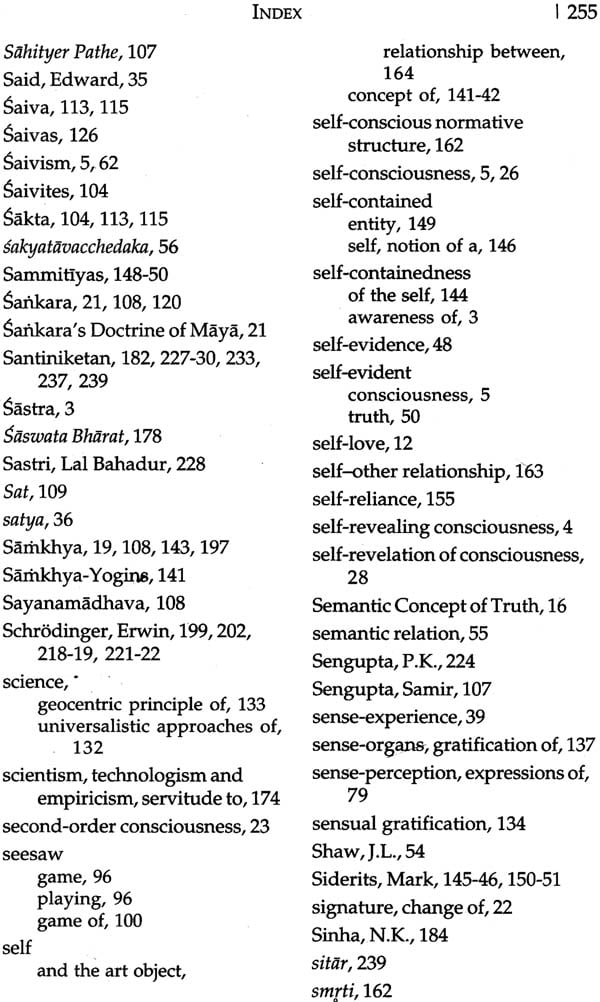
Delivery and Shipping Policy
- INTERNATIONAL SHIPPING
- Rs.1000-1100/kg
- ESTD. Delivery Time: 2-3 weeks (depending on location)
- Bubble Wrapped with Extra Padding
- NATIONAL SHIPPING
- NCR: Rs. 30/half kg
- Standard: Rs. 80/half kg
- Express shipments also available on Request
- ESTD. Delivery Time: Ranging from 1-4 days up to 7 business days (Depending on your choice of Delivery)
- TRACKING
- All orders; national or international, will be provided with a Tracking ID to check the status of their respective orders
- Depending on the Shipping Service, Tracking ID may be used on their respective tracking portals
Frequently Asked Questions (FAQs)
Domestic Shipping: 3-4 Days (after shipping)
International Shipping: 1-2 weeks (based on your location)
You will receive an email once your order has been shipped or you can email us if you didn't receive tracking details (info@mlbd.co.in)
Every book that we sell is the latest edition except all the rare books
Yes, we do provide free shipping, only on domestic orders (within India) above Rs.1500


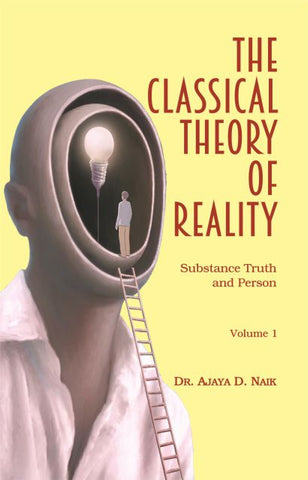
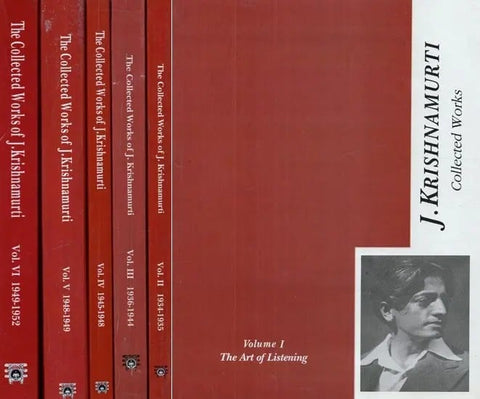

![A HISTORY OF INDIAN PHILOSOPHY [5 VOLUMES] by Surendranath Dasgupta](http://www.motilalbanarsidass.com/cdn/shop/products/HISTORYOFINDIANPHILOSOPHY_large.jpg?v=1675238163)
